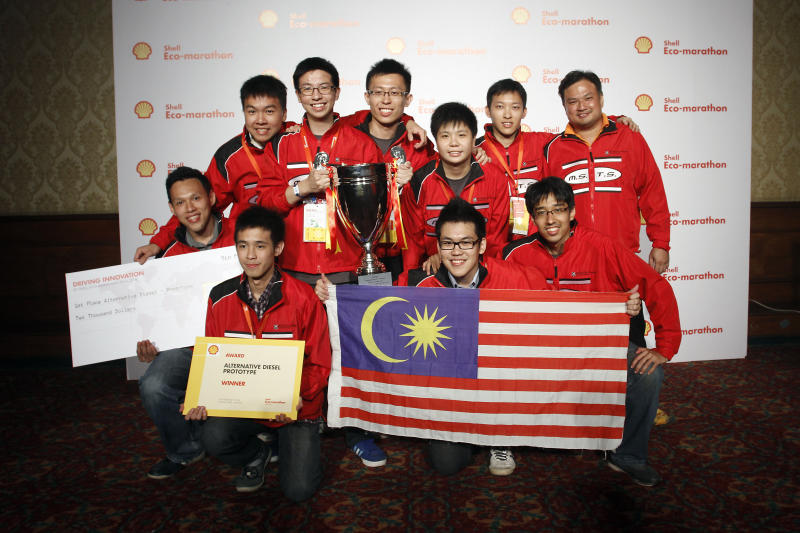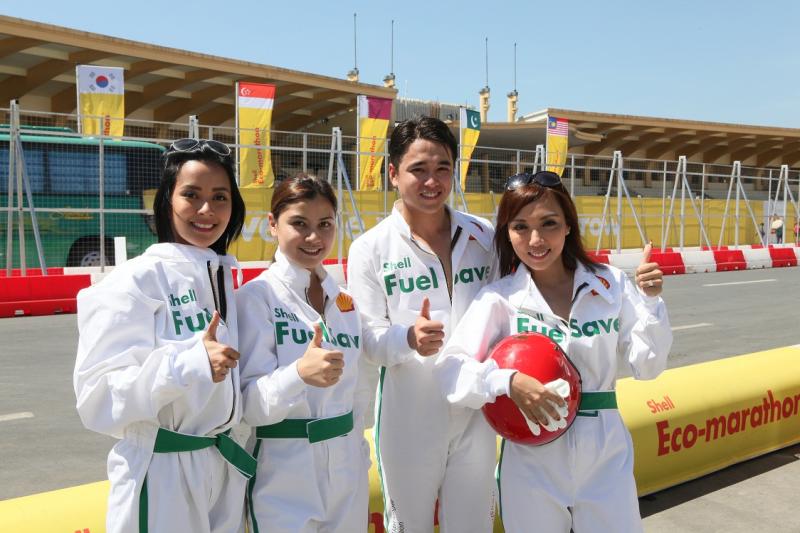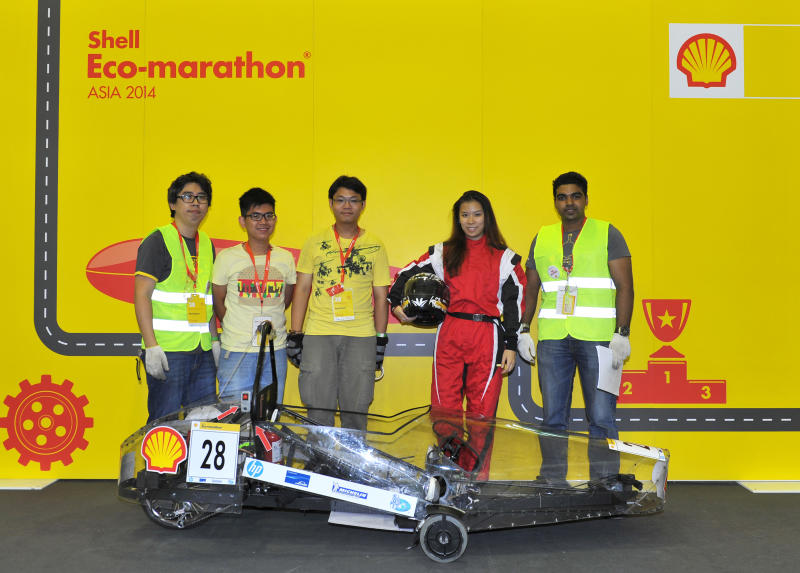By CHRISTINE CHEAH
alltherage@thestar.com.my
TALK about a car race with a difference – instead of speeding ahead to cross the finish line first, teams do whatever it takes to stay out on the track for as long as they can.
Introducing the Shell Eco-marathon Asia 2014, a competition that brings together the continent’s brightest engineering students to design, build and “race” in a car that can travel the furthest on the lowest amount of fuel.
But one thing’s for sure, it’s definitely a marathon for the students involved. The 105 college/university teams from all over Asia would have spent months building their cars from scratch, and R.AGE was right there at Luneta Park, Manila, Philippines to see how the 16 Malaysian teams would fare.
Future energy
According to the United Nations, global energy, water and food demand would rise by 40-50% by 2030. The Shell Eco-marathon Asia is an event to inspire the region’s brightest young minds to come up with solutions to those problems, alongside the Shell Powering Progress Together forum which addresses the sustainability of the world’s vital resources among business leaders and government officials.
The idea for the competition started off in 1939 as a friendly wager between two Shell research scientists in the United States over who could travel the furthest on the same amount of fuel. It has since expanded to three different continents, with the Asian event introduced in 2010 right here in Malaysia.
Already the competition has yielded some astounding results. At this year’s event, Team How Much Ethanol from Panjavidhya Technological College, Thailand drove 2,730km on just one litre of ethanol to take the top prize.
That’s the equivalent of driving from Manila to Jakarta. That first contest back in 1939? They barely managed 21km/l.
The all-time record for Shell Eco-marathon Asia is 2,903km/l, set in 2012 on the Sepang International Circuit, Malaysia, where the event had been held for the past three years. The streets of Luneta Park, however, gave teams a different challenge this year as they provided a more real-world environment to test the vehicles.
The teams are divided into two main categories – prototype and urban concept. The former is all about streamlined, futuristic-looking designs that maximise the vehicles’ fuel efficiency, while the latter is for cars that are more similar to on-the-road vehicles.
Both categories are then divided into further sub-categories, based on the type of fuel used – petrol gasoline, alternative gasoline, diesel, alternative diesel, hydrogen and battery electric.
University Sains Malaysia manufacturing engineering graduate Jeff Quek, a member of USM’s EVT team, said for the participants of Shell Eco-marathon, it’s not just about winning the competition and honing their practical skills – it’s about working towards a better future.
“We want to be part of a more sustainable future,” he said. “We know that oil and gas won’t last forever, so we have to start finding a solution now.”
Shell Malaysia chairman Iain Lo added: “Competitions like Shell Eco-marathon are opportunities for students to be a part of the solution to the world’s energy challenges. It encourages students to challenge the status quo and take measures towards problem solving. This is the innovative mind-set that will be essential in helping Malaysia transform into a developed, high-income economy.”
Money matters
Building a better future requires investment, even if it’s for a student competition. Funding and sponsorship for the teams allow them to focus on engineering solutions, but unfortunately, they’re not all that easy to come by.
Team Ottobot from Universiti Tunku Abdul Rahman, however, didn’t let their lack of a sponsor stop them. They built their car, the UTAR M3, entirely out of the travelling allowance provided by the organisers. It cost them less than RM2,000.
What’s even more crazy is that they disassembled the ultra-light UTAR M3 and checked in all the parts in their luggage on the flight to Manila to save on shipping costs. They also had to go through the hassle of declaring the “goods” at the Philippine embassy in Kuala Lumpur ahead of their flight.
“We couldn’t get any sponsors because we are a new team. In Malaysia, you can’t convince sponsors if you don’t have a track record,” said team manager Vishant Selvarajah, 22.
“The fact that we are here alone is a success. We never thought we could make it on such a low budget.”
In contrast, team UKM1 CAR-ICE from Universiti Kebangsaan Malaysia revealed that their car cost between RM30,000-40,000, and they were lucky to have obtained sponsorships from their university and other local organisations.
The team used the same car they had built for Shell Eco-marathon Asia 2012, but modified to run on ethanol. The most challenging part, however, was producing the fiberglass bodyshell of the car.
“We did everything ourselves without outsourcing any of the parts. So to make the bodyshell hard, smooth and aerodynamically efficient was very difficult,” said marketing team leader Nur Najwaneena Mohamad Lokman, 22.
One thing’s for sure – despite all the challenges, you’ll still see these young engineers back at the event next year, ready to push the boundaries of fuel-efficient engineering all over again.
Malaysia boleh!

Team Monash 2 from Monash University, competing in the Shell Eco-Marathon for the first time, won the prototype alternative diesel fuel category.
MALAYSIA’S representatives at the Shell Eco-marathon Asia 2014 in Manila, Philippines did us proud by grabbing five awards, showing just how talented our young engineers are.
What’s more, Team Monash 2 from Monash University, newcomers to the energy-efficient vehicle design competition, managed to take home two awards – one in the prototype alternative diesel fuel category, and the other being the Shell Helix tribology award. There were 12 “on-track” awards, and six “off-track” awards. The tribology award is given to the team that utilises lubrication engineering best to improve their vehicle’s fuel efficiency.
Team Monash 2’s success owed a lot to their emphasis on keeping their vehicle’s components and engine clean, and by using lubricants of optimal viscosity and volume for all the different parts – alll of which reduces friction, contributing to the overall fuel efficiency of the vehicle.
Another big winner from Malaysia was Universiti Teknologi Mara (UiTM) Shah Alam, which sent two teams for the competition, and both bagged awards.
Team UiTM Eco-Sprint achieved a fuel efficiency of 77.6km/kWh on their vehicle to take the prototype hydrogen category, while their sister team UiTM Eco-Planet won the urban concept hydrogen category with 44.5km/L.
Another Malaysian team to win an award was team UKM 2 Car Fuel Cell of Universiti Kebangsaan Malaysia. They placed second in the same category as team UiTM Eco-Sprint.
Celebrity support

Lisa Surihani (second from left) with her opponents at the Shell FuelSave Celebrity Driving Challenge together with (from left) Filipino TV presenter Bianca Gonzalez, Thai actor Alex Rendell and Singaporean radio announcer Jean Danker.
THE Malaysian teams at Shell Eco-marathon 2014 had a very unlikely cheerleader in Manila – Lisa Surihani.
The actress was there to take part in the Shell FuelSave Celebrity Driving Challenge, held alongside the Eco-marathon at Luneta Park in Manila, Philippines.
But before that, Lisa made sure she visited all 16 Malaysian teams, and presented them a piece of batik to further fuel their excitement.
Lisa’s challenge was to drive as fuel-efficiently as possible on one litre of fuel, and she was up against TV presenter Bianca Gonzalez from the Philippines, Singaporean radio announcer Jean Danker and Thai actor Alex Rendell.
In the end, the four celebrities managed to clock up a total of 218.95km on just the one litre of fuel each, with Lisa finishing a creditable third in the fuel-saving stakes.
Before her trip to Manila, Lisa had received fuel-saving lessons from Shell FuelSave ambassador Fahrin Ahmad.
“This experience was about more than just being part of the challenge. I myself learnt a few fuel-saving tips I never knew about, and I can now be more fuel efficient and manage my motoring costs better.”
As for the Shell Eco-marathon student challenge, Lisa said: The real stars today are the students. It has been my honour to be part of their Shell Eco-marathon experience, and I’ve been so impressed by their dedication and creativity in approaching future energy needs and challenges.”


Tell us what you think!